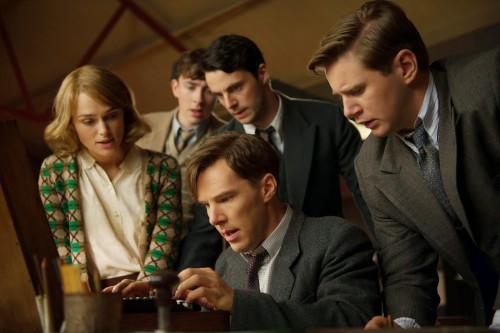The Imitation Game
Alan Turing is considered by many to be the father of modern computing, and whether or not you subscribe to that view, there is no doubt that he was one of the intellectual heavyweights at the beginning of the information technology revolution which continues to impact our everyday lives more and more. The Imitation Game refers to the Turing test (no prizes for guessing who it’s named after), a test in which a computer is asked a series of questions, and from the answers a human must decide whether or not he is talking to a machine or another human. In a best picture field full of hero figures, it would be easy to overlook this one. Surprisingly, this is one of TWO hero-films centred around a hero who is known for intellectual powers rather than physical ones.
“Everyone thinks Enigma is unbreakable”.
“Good. Let me try, and we’ll know for sure, won’t we?”.
The story is fairly well-known – a small band of linguists and mathematicians working at Bletchley Park in a facility disguised as a radio factory break the German Enigma cypher and help win the war. What fascinates and motivates this film is the how of that process. At the centre of the storm, of course, is Alan Turing, an introverted and socially-awkward genius. From the very first scene, where he is interviewed for the job by the commanding officer, it is clear that he sees the world very different to most people, and this is where we get the conflict (and some of the comedy) which engages the audience.
Of course, some of this is artistic license. Alan Turing was by all accounts, quite a sociable person, although with his mind he certainly did see things a little differently. The focus of this film rotates between his constant conflict with all the other humans first because of his mannerisms, then because of his homosexuality, the thrill of the chase in trying to break the Enigma cypher, and the relationship that develops between him and Joan Clarke.
Owing to time constraints, many details of the activity which took place at Bletchley Park were not included, and only one aspect was focused on. While this is a pity, as the work done at the site to break the German codes was diverse and extraordinary (they reverse-engineered an early stream cipher machine using nothing but ciphertext!), the film makers made the correct decision to concentrate on only the main aspect of what they did, and I don’t feel that any of the essence of the story was lost. In fact, it they had gone into detail about everything that happened, it may have diluted the strength of the storytelling substantially, and lost most of the audience. Indeed, when actual details of the mathematics and codebreaking process were included, most seemed clumsily inserted as nothing more than a hat-tip to people like me.
Perhaps this was because I already knew the story behind breaking Enigma in painful detail, and also know a lot about Alan Turing (if you’re surprised by this, then you haven’t been reading this website very carefully), but I was bothered a bit by the at-times forced ‘conflict’ that was created between Turing and his peers, as well as his superiors. It bothers me because this is a story about codebreaking during world war two, and there’s no shortage of real conflicts which you can use to make your film interesting, so there isn’t really a need to invent conflicts that didn’t exist.
I doubt this will win best picture. It’s very good, but it’s not that good. Benedict Cumberbatch is outstanding in it, and in any other year might have won best actor, but the competition is very tough this year. Kiera Knightley, while nice eye candy in an otherwise heavily male-dominated world (look how far we’ve come /sarcasm), is not believable as a double first in mathematics and wrangler, and has inexplicably received a nomination for best supporting actress. I do not think she will get it. The screenplay is excellent and has also been nominated for an oscar.
It’s no secret that I have an intense interest in cryptography. I enjoy puzzles, and have been a writer and participant in several different mystery and puzzle hunts from arond the world, including a particularly memorable experience at the MIT Mystery Hunt way back in 2008. If you want to feel the euphoria of breaking a cipher that you’ve worked on for hours, day, maybe months, then you should watch this movie (some of the scenes echoed my own experiences so closely that they literally sent shivers down my spine). If you want a glimpse of the awesome responsibility that codebreakers have, then you should also watch this movie. When you’re done, you’ll have some appreciation for the importance of cryptography, the genius of Alan Turing, and the tragedy of his death.


Leave a comment